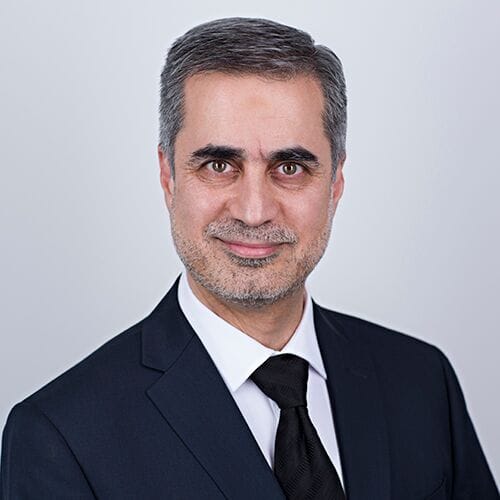Pain medicine
Pain medicine is a medical specialty supporting patients who are experiencing acute or chronic pain.
About pain medicine
Managing pain can be difficult and have a serious impact on your day-to-day life. Acute pain lasts about three months and may be a result of trauma, illness or surgery. Chronic pain is persistent and a long-term condition, for example, spinal pain, sciatica, nerve pain, cancer pain, chronic headaches, abdominal and pelvic pain.
Our expert consultants at Cromwell Hospital and Basinghall Clinic can support you with treatment options and techniques to help you reduce or relieve your pain as much as possible. These treatments include:
- injections; including spinal, facet joint or steroid injections.
- spinal cord stimulation.
- neurostimulation.
- physiotherapy
- occupational therapy.
A spinal cord stimulator system is made up of an implanted battery which is attached to a small lead. The leads are programmed to create a small electrical field. The leads are precisely sited next to a nerve, and the electrical field can result in a reduction of a specific type of pain. Once the spinal cord stimulation system has been surgically implanted, it is controlled by the patient using a handheld controller. Spinal cord stimulation is also sometimes called neuromodulation or neurostimulation.
For some patients, low frequency stimulation, where you feel some tingling (paraesthesia) will be used. For other patients’ higher frequency stimulation, where you cannot feel anything, will be the best treatment for the pain. The type of stimulation is selected by the pain consultant and is determined by the pain condition you have. Your pain consultant will discuss all these options and help you decide which form of stimulation is best for your pain.
An epidural injection is an injection in the back to relieve pain in any part of the body. It is commonly used to relieve pain during childbirth but is also often used to treat pain in the back or leg that is caused by a slipped disc or related condition.
What happens during an epidural?
You will be asked to lie on your side or stomach and will be given a local anaesthetic to numb the area in your back where the injection will take place. Your consultant anaesthetist will insert a thin tube, called a catheter, into your back, close to the nerves that cause pain. Pain medicine is then delivered through the catheter. The length of time that the catheter will remain in depends on your condition. Epidural injection for chronic pain can also be administered as a day case procedure with a needle under X-ray guidance without the need of a catheter.
A facet joint injection is a diagnostic investigation used to assess pain that might be caused by the facet joints – the linking joints in the spine. It also sometimes used to relieve pain.
What happens during a facet joint injection?
You will be asked to lie on your stomach and will be given a local anaesthetic to numb the area in your back where the injection will take place. Your consultant will carefully insert a needle into the affected area to inject pain medicine under X-ray guidance. If this relieves pain, your consultant will be able to diagnose the root cause of the pain as your facet joints. Sometimes an ultrasound scanner is also used in the process to help assist the procedure.
The sacroiliac joint is a joint at the bottom of the spine. A sacroiliac joint injection is used to diagnose and treat back pain by relieving pain from the joint.
What happens during a sacroiliac joint injection?
Local anaesthetic will be given to numb the affected area in your back. Your consultant will then gently insert a needle and inject the pain medicine. An X-ray may be used to assist the procedure, which will last around 30 minutes.
Radiofrequency ablation is a procedure whereby a nerve that is causing pain is heated, causing a lesion. This in turn relieves the pain that was caused by that nerve. This procedure often provides more effective long-term pain relief than other methods.
What happens during radiofrequency ablation?
Local anaesthetic will be given to numb the affected area. Your consultant will then insert and direct a needle towards the pain-generating nerve. A small electrical current is passed through to create a heat lesion on the nerve, effectively stopping it from sending pain signals to the brain.
Self-pay packages
As well as working with all major insurance companies, we also welcome patients who wish to pay for themselves. We offer a range of self-pay package options, including:
- Fixed Price Packages: these are comprehensive, all-inclusive packages that group everything you may need into one clear price. All of our Fixed Price Packages include diagnostics, procedure, all professional fees, all post-op outpatient care and any other consultant-recommended services as part of you treatment.
Private pain medicine specialists in London
Paying for your treatment
We welcome both self-paying and insured patients.
Self-pay patients
We offer several ways for patients to self-pay, including pay-as-you-go and self-pay packages.
Insured patients
At Cromwell Hospital, we accept private health insurance from most major providers, including AXA, Aviva, Bupa, and Vitality.
Our locations

Cromwell Hospital
164-178 Cromwell Road
London SW5 0TU
United Kingdom
+44 (0)20 7460 5700
Book an appointment today
Call us now for appointment bookings, general queries, and personalised quotes.
Alternatively, you can contact us using our online form.




